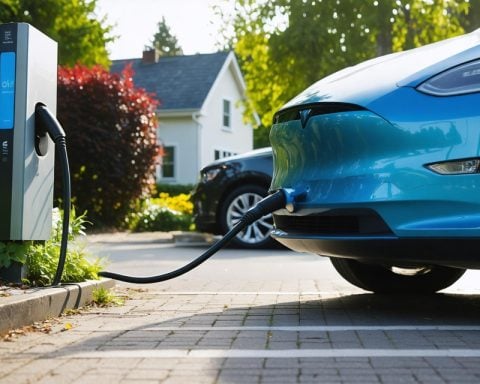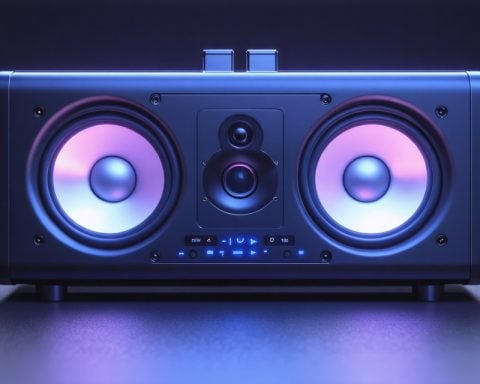- Ford’s innovative modular battery packs allow easy replacement and repair, aiming to cut costs and enhance recycling.
- An immersion-cooling system in Ford’s designs prevents battery overheating, boosting safety and performance.
- Ford is exploring rear-placed batteries for effortless docking and battery swapping, offering a new approach in the EV market.
- GM introduces a dual-port charging system, enabling rapid charging and simultaneous power sharing with other devices or vehicles.
- American automakers like Ford and GM are pivotal in the transition to sustainable, clean mobility through innovative EV technologies.
- The competitive landscape signifies a shift towards American leadership in the global electric vehicle market.
Step into the sizzling world of electric vehicles, where the thrill of innovation electrifies the air. Under the shadow of Tesla and ambitious Chinese brands, American giants like Ford and General Motors are quietly engineering a seismic shift in EV technology.
Picture a future where EV batteries become as easy to fix as swapping a bulb. Ford’s latest patent unveils a revolutionary concept—modular battery packs designed for independent removal. Imagine sleek, floor-based designs with spring-loaded connectors that pop batteries out like well-oiled gears. This ingenious setup promises to slash repair costs and recycle more parts, all while reducing waste. Not to mention, an inventive immersion-cooling system keeps these powerhouses from overheating, enhancing safety and performance.
Meanwhile, Ford envisions a world where cars swiftly dock into stations for a seamless battery swap. Unlike its competitors, Ford tinkers with placing the battery at the vehicle’s rear, promising a fresh take on a burgeoning trend.
Not to be outdone, GM is crafting its own electric tapestry. Its dual-port charging design heralds the dawn of rapid charging for larger EVs, while also allowing the vehicle to charge up one port while powering devices or even other cars with the second.
This flurry of patents reveals a deeper narrative. American automakers are not mere spectators but active participants crafting the tapestry of tomorrow’s transportation. In a world gearing towards clean mobility, this surge of creativity reflects the vital role legacy carmakers play in accelerating the shift away from fossil fuels.
In this battle for the future, innovation is key, and these developments hint at a new era where American prowess may take the lead once again. Will this be enough to outpace the electric revolution led by others? Only time will tell. But one thing is certain—the race is on.
The EV Revolution: Are American Automakers Ready to Lead?
How-To Steps & Life Hacks
To stay ahead in the fast-evolving electric vehicle (EV) landscape, consumers need to be informed about efficient vehicle maintenance and charging strategies:
– Battery Maintenance: With modular battery packs, as proposed by Ford, understanding DIY battery swapping can save time and reduce service costs. Always familiarize yourself with the vehicle’s user manual or consult with a Ford-certified technician before attempting maintenance.
– Optimal Charging Habits: For dual-port charging systems like GM’s, consider using one port for vehicle charging and the other for powering other devices, particularly during long trips. This approach optimizes charging efficiency and keeps everything powered.
Real-World Use Cases
– Fleet Management: Modular batteries can revolutionize fleet operations by reducing downtime. Time spent on charging can dramatically decrease, as battery swapping allows quick turnaround times.
– Emergency Power: GM’s dual-port approach can be pivotal during power outages, where your EV can double as a power source for home or work essentials.
Market Forecasts & Industry Trends
The global EV market is poised to experience a compound annual growth rate (CAGR) of around 22% from 2021 to 2030. American automakers like Ford and GM are investing heavily in EV technology to capture more market share, focusing on innovative features such as modular batteries and dual-port charging to differentiate themselves. Ford and General Motors
Reviews & Comparisons
– Modular Battery vs. Traditional: Traditional fixed batteries are commonplace, but Ford’s modular options can decrease repair time and costs. This innovation can potentially elevate Ford’s market position.
– Dual-Port Charging Efficiency: Currently, most vehicles offer a single charging port. GM’s dual-port system introduces flexibility and speed, appealing to tech-savvy consumers and businesses requiring rapid turnaround.
Controversies & Limitations
While modular battery packs and dual-port systems are promising, they bring their own set of challenges:
– Standardization: Differences in battery designs may make standardization a hurdle, complicating adoption.
– Repair Complexity: While modular systems simplify battery swaps, it may still require specialized equipment or personnel, potentially introducing bottlenecks if not well-implemented.
Features, Specs & Pricing
– Ford’s Modular Battery Pack Features:
– Spring-loaded connectors for easy swap
– Immersion-cooling system for safety
– Potential market price: TBD based on vehicle type and battery size
– GM’s Dual-Port Charging System:
– One port for vehicle charging
– Second port for external device powering
– Price dependent on vehicle model and configuration
Security & Sustainability
Ford’s and GM’s approaches emphasize sustainability by:
– Reducing Battery Waste: Easier recycling of battery modules
– Energy Efficiency: Enhanced cooling systems and rapid charging reduce energy loss
Insights & Predictions
As American automakers innovate, they are set to reclaim a leadership role in the EV market. The focus on user-friendly features like modular batteries and dual-port charging reflects a move toward consumer-centric design, which could shift global perceptions and competitiveness.
Tutorials & Compatibility
– User Manuals: Ensure your vehicle’s firmware is updated to support new features.
– Compatibility Checks: Regularly consult with dealers to ensure your current vehicle model can support future upgrades like modular packs or dual-port chargers.
Pros & Cons Overview
Pros:
– Quick battery swaps reduce downtime
– Dual-port charging offers flexibility and efficiency
– Innovative cooling systems enhance safety
Cons:
– Potential challenges in module standardization
– Repair and maintenance might still require specialized knowledge
Actionable Recommendations
1. Stay Informed: Regularly check updates from automakers and industry news to keep up with the latest features and technologies.
2. Early Adoption: Consider adopting new technologies like modular batteries or dual-port chargers if they align with your use case to future-proof your investment.
3. Eco-Conscious Choices: Support brands that prioritize sustainability in design to contribute to a greener future.
In conclusion, as innovation accelerates in the EV sector, American automakers are setting the pace with thoughtful technology developments. Stay engaged and informed to make the most of these advancements in your own EV journey.













